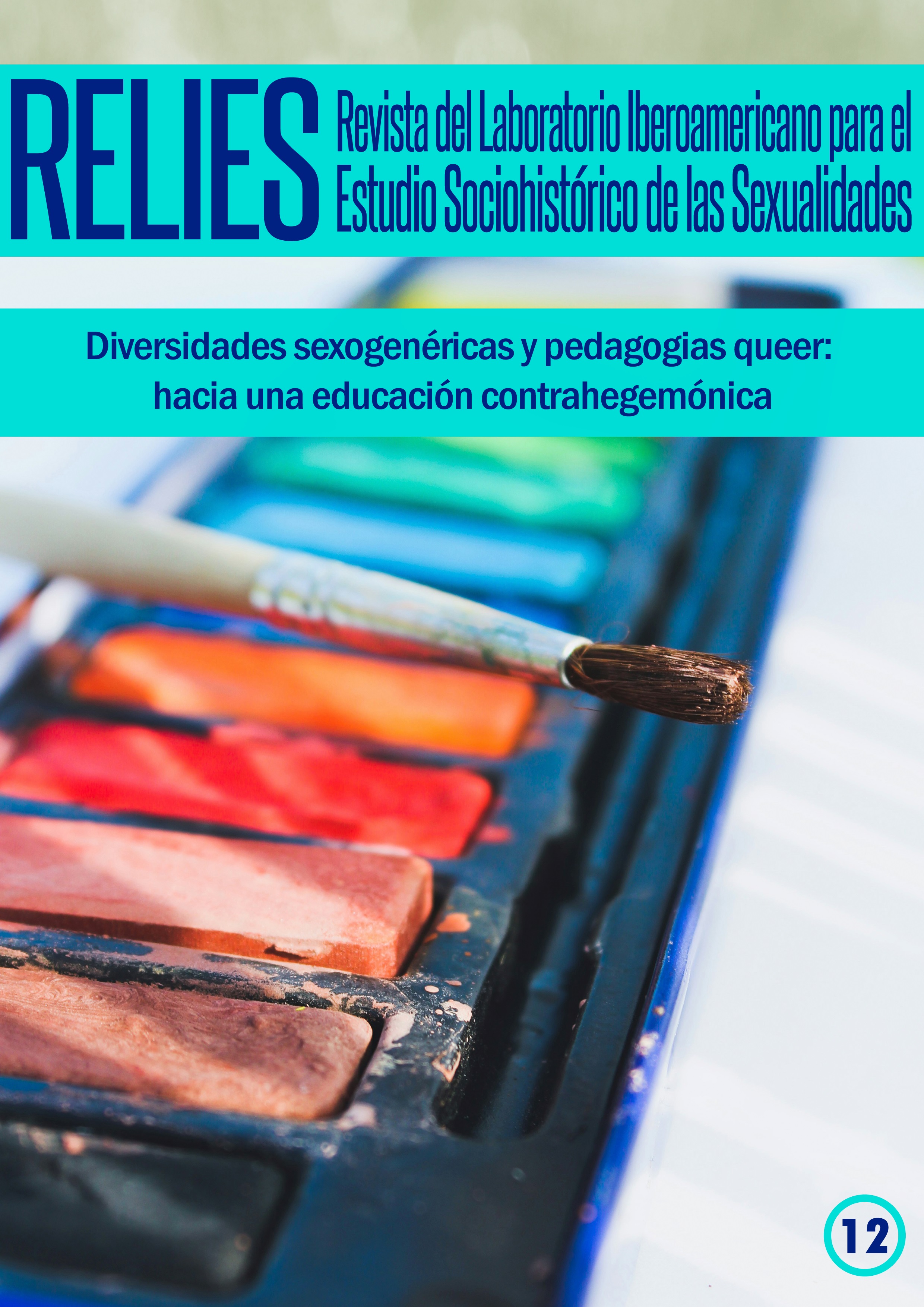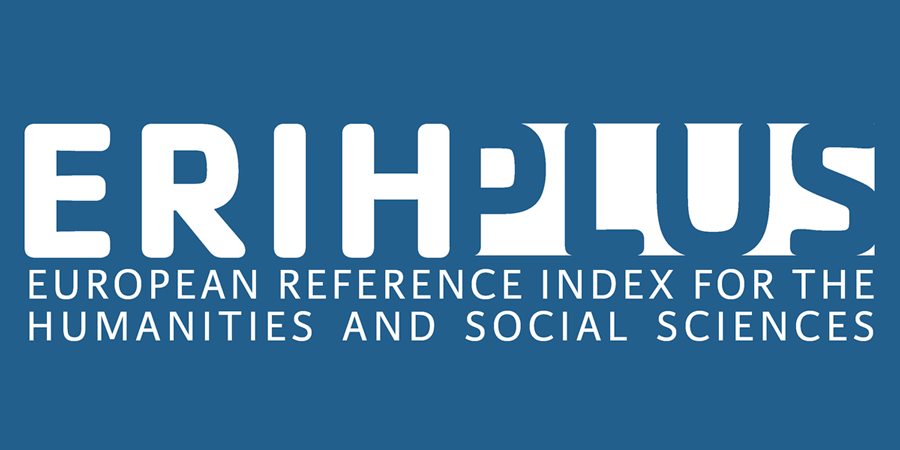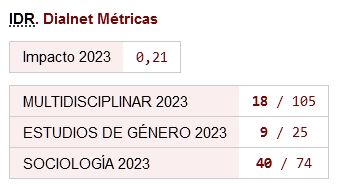Intersexuality(s) and teacher (de)training
challenges of queer pedagogy
DOI:
https://doi.org/10.46661/relies.11247Keywords:
intersexuality, teacher training, gender diversity, queer pedagogyAbstract
This research work arises from the aim of finding out about the initial training of Primary Education teachers on intersexualities and the various barriers with respect to the inclusion of intersex pupils. We believe it is necessary to learn about their training, obstacles and proposals for improvement in the construction of an inclusive school for all pupils. The methodology we used was quantitative, and we used a group of 172 students from the three years of the fourth year of Primary Education at the University of Cadiz to gather information. Among the most significant results, we highlight the lack of training that teachers have on intersexualities, they show a great lack of knowledge about intersexualities, and they do not have the tools to work inclusively on this issue in schools. As reflected in the research, it is a challenge to be overcome from the perspective of queer pedagogy to transform schools towards an inclusive and quality educational model that guarantees the participation of all students intersex in their educational process and in the life of the school community.
Downloads
References
Bejarano, M. T. y Marí, R. (2019). Educación en sexualidad e igualdad. Discursos y estrategias para la formación de docentes y educadores sociales. Dykinson.
Britzman, D. P. (2002). La pedagogía transgresora y sus extrañas técnicas. En R.F. Mérida (Ed.), Sexualidades transgresoras: una antología de estudios queer (197-229). Barcelona: Icaria.
Cabral, M. (2006). El cuerpo en el cuerpo. Una introducción a las biopolíticas de la intersexualidad. Orientaciones: revista de homosexualidades, 11, 47-68.
Cantos, F. J., Moliner, L. y Mateu, R. (2021). Relatos de vida de docentes LGTBIQ+: una propuesta educativa para la formación del futuro profesorado. En J.A. Marin, J.C. de la Cruz, S. Pozo y G. Gómez (Eds.), Investigación e innovación educativa frente a los retos para el desarrollo sostenible (pp. 908-920). Dykinson. https://doi.org/10.2307/j.ctv2gz3w6t.75
Chase, C. (2005). Hermafroditas con actitud: cartografiando la emergencia del activismo político intersexual. En C. Romero Bachiller (Coord.), El eje del mal es heterosexual: figuraciones, movimientos y prácticas feministas queer (pp. 87-112). Madrid: Traficantes de Sueños.
Díaz de Greñu Domingo, S., y Anguita Martínez, R. (2017). Estereotipos del profesorado en torno al género y a la orientación sexual. Revista Electrónica Interuniversitaria de Formación Del Profesorado, 20(1), 219. https://doi.org/10.6018/reifop/20.1.228961
Domínguez, Y; Gutiérrez, J y Gómez N. (2017). Equidad, género y diversidad en Educación. European Scientific Journal, 13(7),300-319. https://doi.org/10.19044/esj.2017.v13n7p300
Domurat Dreger, A. (2000). Hermaphrodites and the Medical Invention of Sex. Harvard University Press. https://doi.org/10.4159/9780674034334
Faur, E. (2007). La educación en sexualidad. El monitor de la educación, 11, 1-3.
Fausto-Sterling, A. (1993). The five sexes: Why male and female are not enough. The Sciences, p. 20-24. Recuperado de http://www.fd.unl.pt/docentes_docs/ma/TPB_MA_5937.pdf
Fausto-Sterling, A. (2006). Cuerpos sexuados. Melusina.
Giroux, H. (2016). La pedagogía crítica en tiempos oscuros. Praxis educativa 17(2), 13-26.
Granero Andújar, A y García Gómez, T. (2020). Las intersexualidades en la educación afectivo-sexual: análisis sobre su presencia y tratamiento. Revista Educar, 56, 439-456. https://doi.org/10.5565/rev/educar.1092
Gore, J. (2000). Disciplinar los cuerpos: sobre la continuidad de las relaciones de poder en pedagogía. En T. Popkewitz y C. Brennan (Coords.), El desafío de Foucault: discurso, conocimiento y poder en la educación (pp. 228-249). Barcelona: Pomares-Corredor.
Harvey, A. (1997). Gay mystics. Harper Collins Publishers.
Hooks, B. (1994). Teaching to Transgress. Education as the Practice of Freedom. Routlege. https://doi.org/10.3366/para.1994.17.3.270
Lauretis, T. (1987). Tecnologies of Gender: essays in theory, film, and fiction. Indiana University Press. https://doi.org/10.1007/978-1-349-19737-8
López Medina, E. F., & Sanders, S. (2022). “Usualizar” la diversidad para superar los silencios del currículum en torno al género y la sexualidad. RELIES: Revista Del Laboratorio Iberoamericano Para El Estudio Sociohistórico De Las Sexualidades, (7), 1–18. https://doi.org/10.46661/relies.6150
Martín Aragón, M. del M. (2023). Acceso a la justicia de víctimas de discriminación y violencia por motivos de orientación sexual e identidad sexo-genérica en España. Revista Llapanchikpaq: Justicia, 5(7), 23-56. https://doi.org/10.51197/lj.v5i7.863
Martín Aragón, M.M. (2019). Incidentes LGTBIQfóbicos en España: Más allá de los delitos de odio. Revista Electrónica de Estudios Penales y de la Seguridad, 5 (extra), 1-17.
Muñoz, José E. (2009). Cruising Utopia: The Then and There of Queer Futurity. New York University Press.
Moreno, E. (2000). La transmisión de modelos sexistas en la escuela. El harén pedagógico. Perspectiva de género en la organización escolar. Barcelona: Graó, 11-30
Pardo Coy, R y Oltra Albiach, Miquel. (2022). Educar en la diversidad: investigación y activismo en las aula.Octaedro.
Planella, J y Pié. A. (2012). Pedagoqueer: resistencias y subversiones educativas. Educación xxi,15, 265-283. https://doi.org/10.5944/educxx1.15.1.159
Sánchez Torrejón, B. (2024). Pedagogía queer: avances y retos desde una escuela contrahegemónica. Revista De Estudios Socioeducativos. ReSed, 1(12). https://revistas.uca.es/index.php/ReSed/article/view/10820 https://doi.org/10.25267/Rev_estud_socioeducativos.2024.i12.14
Sánchez Torrejón, B. (2024). Atención a la diversidad sexogenérica y educación inclusiva: caminando hacia una escuela arcoíris. European Public & Social Innovation Review, 9, 1–15. https://doi.org/10.31637/epsir-2024-633
Santos, A.C. (2006). Entre a academia e o activismo: Sociologia, estudos queer e movimiento LGBT em Portugal. Revista Crítica de Ciências Sociais, 76,91-108. https://journals.openedition.org/rccs/867 https://doi.org/10.4000/rccs.867
Vizuete, E., Samaniego, E., y Rodríguez, E. (2001). Guía Forma Joven. Educación para la Sexualidad. http://educagenero.org/FormaJoven/Guia_Forma_Joven_Educacion_Sexualidad.pdf
Wynee, N. (2008). An analysis of student teacher preparation in relation to homophobia. (Tesis doctoral inédita). Universidad del Estado de Humboldt, California.
Downloads
Published
How to Cite
Issue
Section
License
Copyright (c) 2024 Begoña Sánchez Torrejón, Wendell Rhamon dos Santos de Jesus Silva

This work is licensed under a Creative Commons Attribution-NonCommercial 4.0 International License.






